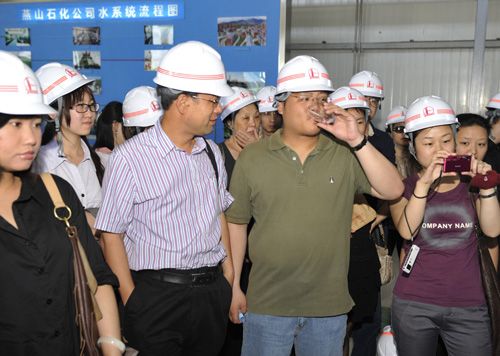|
 |
|
SHOWING COMMITMENT: A journalist drinks purified water at a water purification workshop of Sinopec Beijing Yanshan Co. on May 31, 2011. The company opened its business to the public on the day to show its commitment to social responsibilities (LU PENG) |
On May 26, the China National Chemical Corp. (ChemChina), the country's largest chemical product manufacturer, released its corporate social responsibility (CSR) report in Beijing. The report highlighted the company's role as the main sponsor of the Chemical Industry Museum of China.
The museum was built to showcase China's history of chemical development. It is also expected to help disseminate knowledge about chemicals and to facilitate exchanges among professionals from around the world.
The report also presented accomplishments the company had made in its drive toward sustainable development in safe production and environmental protection.
ChemChina, founded in May 2004, is ranked among the world's top 100 chemical corporations. In 2011, the company made the Fortune Global 500 list for the first time.
"Responsibility fosters future growth," said Ren Jianxin, President of ChemChina.
Being hallmarks
The term CSR came into general use in the late 1960s. It is corporate self-regulation that encourages companies to exert a positive and ethical influence on the environment, consumers and society instead of just aiming for profits. The concept was introduced to China by foreign companies in joint ventures in the 1990s.
In recent years, the topic of CSR has become increasingly prevalent around the world. More and more enterprises have gradually become aware of CSR's importance to their competitiveness and taken actions to improve their social image.
As a rising force in the global market, Chinese enterprises, especially centrally-administered state-owned enterprises (SOEs) that aim to establish world-class brands, have also begun fixing their eyes on CSR. In 2011, 898 CSR reports were issued by Chinese enterprises, representing an 18.2-percent increase from 2010, according to a report released during the Seventh International Corporate Social Responsibility Forum, which was held in Beijing on June 5.
"China's enterprises have already recognized the importance of fulfilling social responsibilities, and a CSR reporting system has gradually come into form," said E Defeng, Deputy Director of the Department of WTO Affairs of the Ministry of Commerce.
In November 2011, the Chinese Academy of Social Sciences (CASS) published a report, saying that of all companies in China, state-owned enterprises (SOEs) on the whole have performed far better than private and foreign-funded ones in fulfilling CSR.
According to the report, the evaluation was based on the performance of 300 enterprises, including 100 state-owned, 100 private and 100 foreign-funded ones. The index consisted of four items: corporate responsibility management, market responsibility, social responsibility and environmental responsibility.
The average score of state-owned enterprises was 31.7 on a 100-point scale, much higher than private businesses at 13.3 and foreign-funded companies at 12.6.
"Of all SOEs, centrally-administered enterprises perform the best with the highest average score of 43.8 points," said the CASS report.
According to the report, centrally-administered SOEs have played a leading role in promoting China's social and economic development, resource conservation and environmental protection, as well as in combating major natural disasters.
The State Grid Corp., the Sinopec Group and other centrally-administered SOEs have not only fulfilled their social responsibilities through specific projects, but also made great efforts to promote institutional innovation.
Last year, Sinopec Group invited 12 people from higher education institutions and the media to supervise and advise its CSR fulfillments.
Earlier this year, the company set up a social responsibility management committee that includes all of the company's board directors, with Fu Chengyu, President of Sinopec Group, as its head.
"The move is intended to facilitate the overall planning of our social responsibility management work, and promote the establishment of a company-wide social responsibility management system," said Zhou Quansheng, a senior official with the Publicity Office of Sinopec Group.
At a meeting last November, Wang Yong, Minister of the State-owned Assets Supervision and Administration Commission of the State Council (SASAC), which oversees centrally-administered SOEs, said that centrally-administered SOEs had done well in at least five areas in fulfilling social responsibilities. "They make great contribution to state revenue, implement national macro-control policies, spare no effort to ensure stable market supplies, fully support the development of livelihood projects and actively participate in poverty alleviation projects and pair assistance to Tibet and Xinjiang, and play a key role in accomplishing urgent, difficult and dangerous tasks," Wang said.
| 